You and I Are Too Old Not to Be the Shelter for Others
Too Old for This Sh*t: How to Take Your Life Back from an Ageist Society
We’re all lost. Will we be there for one another?
An inukshuk (pl. inuksuit) is a stone formation traditionally built by the Inuit. Originally spelled inuksuk, the word inukshuk means “to act in the capacity of a human.”
Horror lovers might have watched The Terror on Netflix, a BBC film based on Dan Simmons’ terrific book of the same name. The movie is a fictional account of the very real, very awful, events surrounding the failed 1845 attempt to find a Northwest passage to China and beyond. The Franklin Expedition featured the first steam-powered vessels (the Terror and the Erebus), the most scientifically advanced of their kind of the time, but still woefully inadequate for the job.
In the fictionalized version, Simmons imagines a terrible creature that stalks the Arctic and these doomed men. But the true terrible creature is man himself.
In one scene, a small family of Inuit are approached by a starving sailor, sent out to see if they’re friendly. Using hand gestures, the sailor indicates he’s hungry.
The Inuit understand the Artic and the terrible desolation of that world. The man gives the sailor some seal jerky. I won’t spoil the rest of the story, but you can imagine what ensues as a result of such profound compassion.
It’s the offer of food that I want to highlight. There is no gesture anywhere in the world more powerful than offering sustenance, especially to a stranger, and even more so to a stranger in extremis.
We are all hungry. Our predicament is that we are feeding ourselves and each other everything BUT what we most need.
In the small town of Yellowknife where I just spent five days to see the storied aurora borealis (and did), there are inukshuk symbols everywhere. Perhaps what struck me the most was that in this remote, desolate land, stretching far up towards the Arctic, people who live here have always had great concern for others.
Others in this sense meaning fellow travelers, tribe members, people who needed help finding their way home.
Sometimes people would leave a cache of food at the base, or an inukshuk would point to a fishing or hunting spot.
This article explains some of the different types and their meanings. Above all, the inukshuk is a symbol of deep and abiding care for others.
All others, others who are lost, hungry, who need direction, a way home.
That would be all of us right now.
In some way we are all starving.
You see this in our violence, our obesity, you see it in our mental health, suicide rates, our desperation, our crushing debts, our hate, our viciousness.
You see our starvation in our spousal abuse, our sexual predation, our wars, our weaponizing of religious figures for the sake of hate, our gun culture, our othering.
The hunger is there, but we feed it with all the wrong foods. “Food” in this sense isn’t literal food.
Fourteen years ago I wrote a book called Wordfood to address the idea that all of us take in all kinds of “food” each day, beginning with the words we feed ourselves first thing in the morning.
You know that conversation. Is it toxic or is it nutritious? What do you say to your image?
We take in the food of impressions: what we surround ourselves with, the media, the messaging, the environment, the people, the community, the books we read, all of it. Those impressions, millions of them every day, can be toxic or they can be nutritious.
Many if not most of these we can choose. Even Victor Frankl, living in a Nazi concentration camp, found a way to deal with what surrounded him. The power of the mind is absolute in this sense: we can choose to change how we see and perceive, and by doing so, choose not to be poisoned by what we experience, the food of impressions.(1)
What’s better, however is to change what we expose ourselves to in order to better change the outcome inside ourselves.
We can choose, albeit it’s much harder, to shut down or limit social media. This isn’t the article to regurgitate all the research around the sewage that is social media. Suffice it to say that Dear Reader likely knows full well the cost of being addicted to screens.
But do we, really?
The ensuing, horrible isolation and loneliness that all too often follow when we stop reaching out, caring for, interacting with and offering sustenance to each other- those are toxic. We are starving for each other.
We need to be the inukshuk.
When I first met Yellowknife-based artist Robbie Craig, I was struck by his art. The next day I went back to buy more prints. I left with a story about what it means to be an inukshuk.
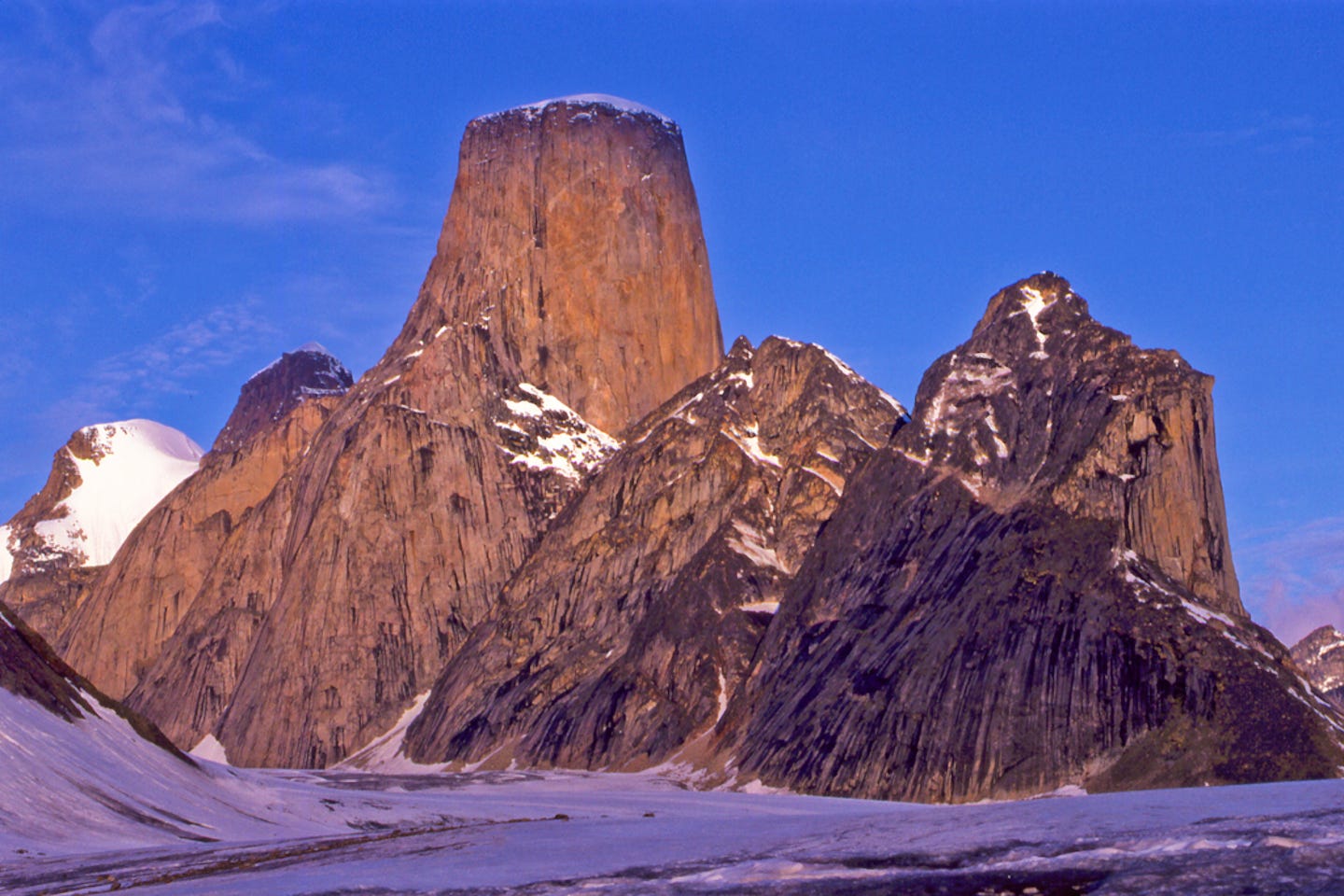
Robbie had long wanted to hike Baffin Island, a place where few get to go and where there are some fascinating geographical features worthy of his inventive interpretation.
Finally one summer he was able to organize a trip with a few friends.
The area where they were hiking is remote and dangerous. So imagine their surprise when they spotted a lone figure making its way towards them.
The figure turned out to be female. She was exhausted, her pack too heavy. She was hiking in Crocs.
She was in real trouble. Apparently, she was an artist who had won some kind of grant, the details of which mattered little at that point.
They got her organized, fed and to bed.
The next morning, the woman was gone. Around their tents, she had set out an offering of her canned food. The consensus was that she had hiked back. They looked, but never found her. It was summer, so no snow tracks.
Robbie’s group did precisely what we are all tasked to do. In the great northern expanses, people are few, predators are many and in most cases you can’t take a weapon.
All we have is each other.
They were inukshuk for her, and may well have saved her life.
Those rules are no different if we’re in an apartment building in Manhattan, in my treed neighborhood in Eugene, in one of the battered and storm-damaged communities in Florida or North Carolina where right now, all people have are one another.
When we show up, we are fed the most important human food of all: compassion. The recognition of our worthiness and our human vulnerability.
The yard signs don’t matter as much as our collective need for community. That’s why being of service is sacred work.
We are hungry. We are starving. We are stuffing ourselves with toxins when what we truly need is each other.
Before leaving Yellowknife, I went to the above gallery where I found an antler bone, carved with an inukshuk, on a leather thong. It’s likely going to live on a corner of my computer screen.
While I don’t always achieve this to the level I’d like, I want my writing to be an inukshuk. So many fellow writers’ work has shown me the way, given me sustenance, maybe even saved me every so often.
This trip to Yellowknife allowed me to put that intention into clearer focus. It’s a whole other standard to achieve, not only through my writing but even more importantly, how I show up in the world, face-to-face.
I hate the cold, yet the great north draws me. Perhaps it’s the spirit of the place, the immense empty spaces sparked here and there with equally- immense human kindness driven by great need.
We are all in great need right now. Most of us have no idea what it is that we hunger for. I think it’s pretty simple.
The power of the Inukshuk symbol, care for others, no matter who they are, is what I’m taking home.
I came for the aurora borealis.
I left with grace.
We are obese yet starving. We are surrounded by billions but lonely.
If we want the food of life, we must offer it to others first.
Be the inukshuk.
This is dedicated with great regard to all those writers who are inukshuks for all of us. Thank you.
I hope this little piece inspired you. I sure came home inspired and hope that a step into a different culture was worthwhile. If so, please consider
Above all, please consider the quality of what you ingest, be it words, social media, advertisting, movies, friends, family, or food. All of it matters. You are worth ingesting what creates more love in your life.
(1) Those familiar with the work of Gurdjieff, this is a reference to his teachings.


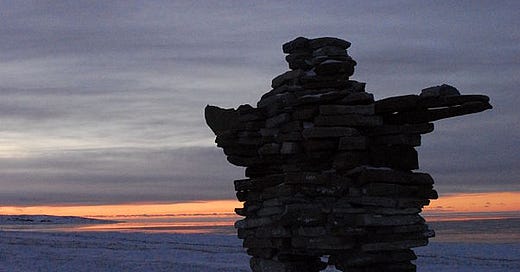



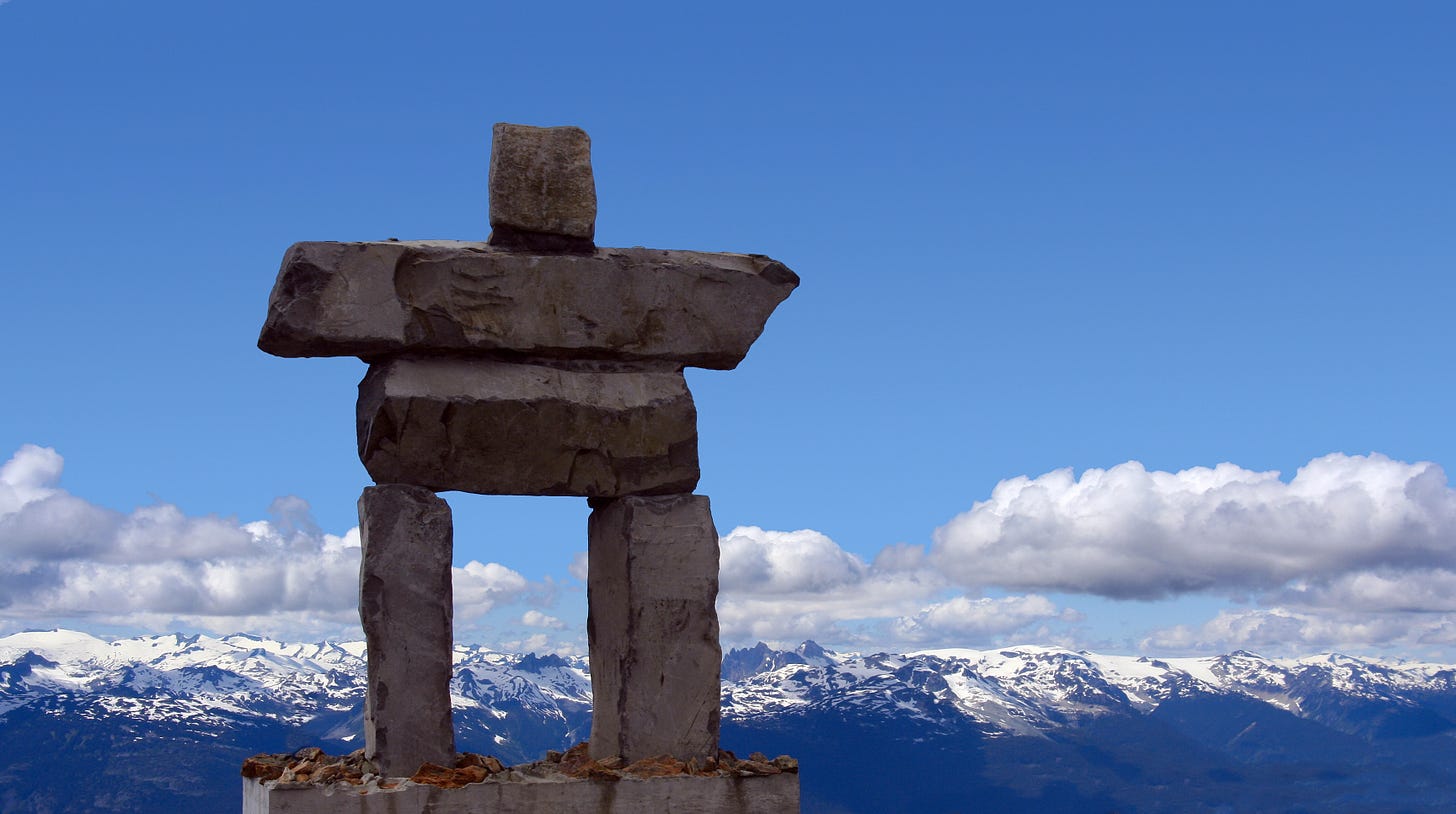
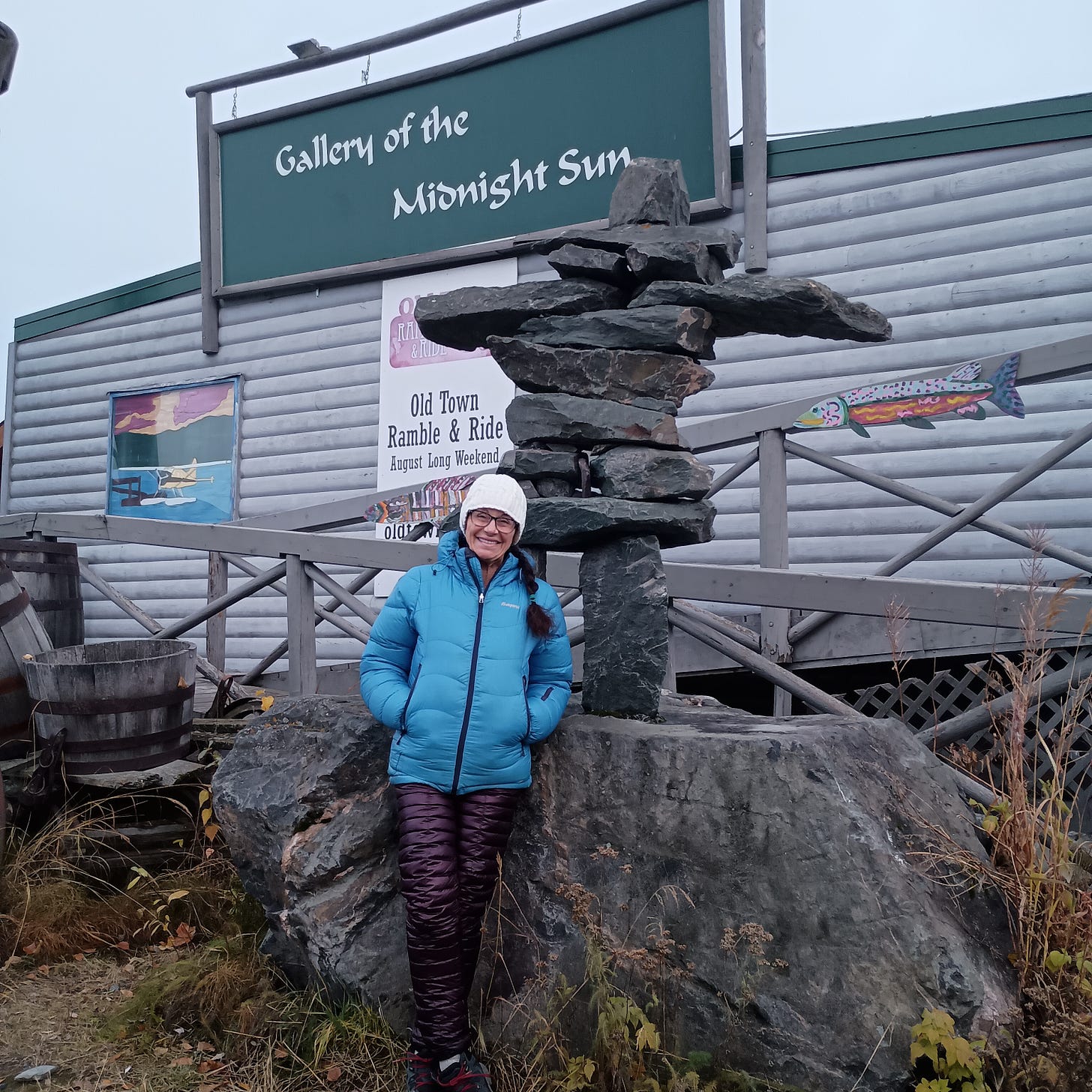
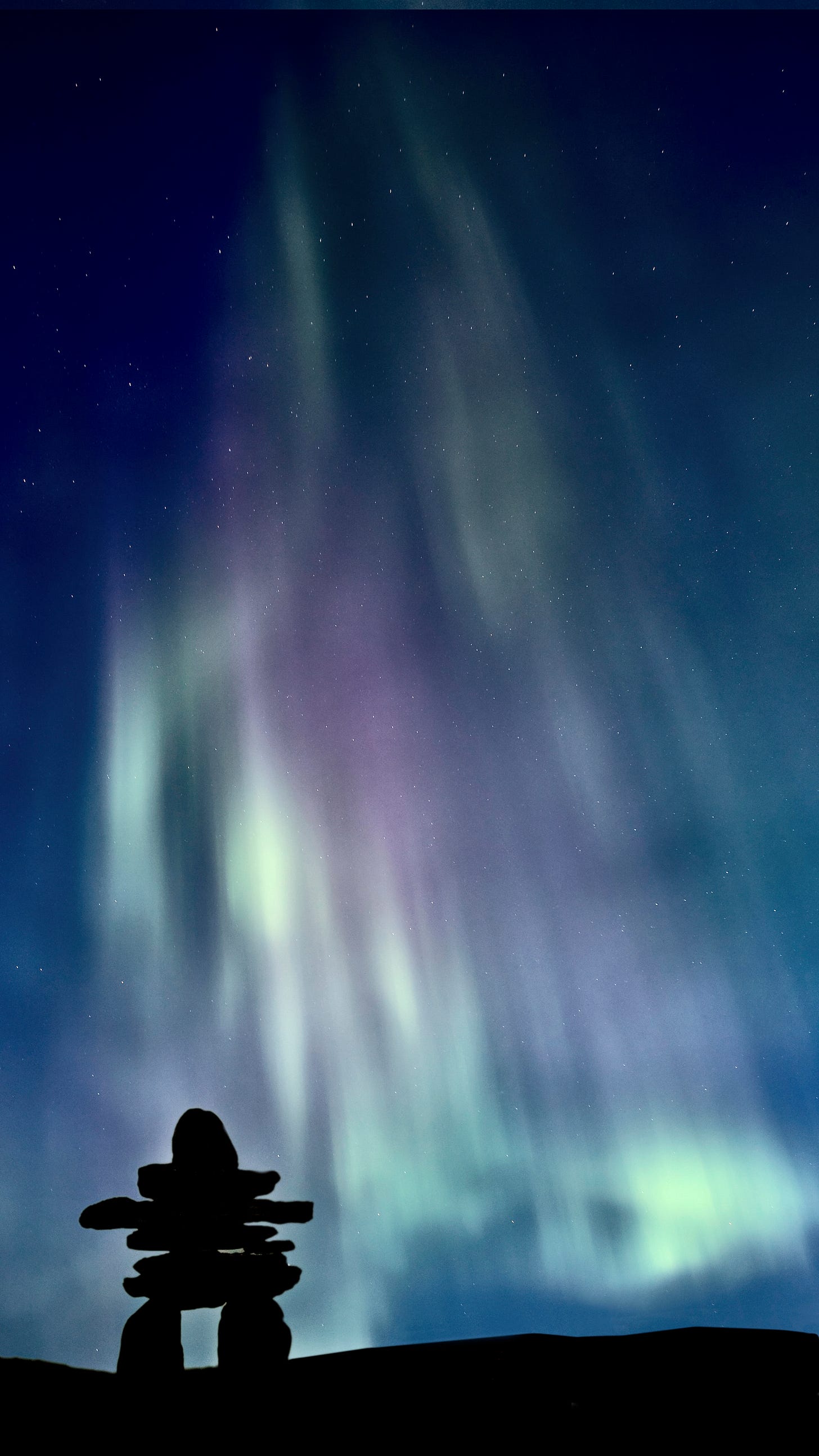
Wow what a critical message for our times, for all of us, Julia. You have been an inhukshuk for me on so many occasions with your fierce, beautiful, powerful essays. We are not too old to be the shelter for others. I saw this time and time again on the Camino, how strangers who were fellow pilgrims were there for each other, helping to walk them home, when someone was hurt, tired, hungry, lost, despairing of their ability to make it. Or give companionship for part of the way to a solitary walker, a bit lonely. Thanks for shining your light. I am so glad you got to see the aurora borealis in all its splendor.
Julia, I just read this article of yours and loved it. Your articles are so profound and informative. Though I am behind in reading them, I have them saved in my email so as not to miss any. Thank you. I look forward to reading them all.